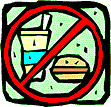By Ellen Kuwana
Neuroscience for Kids Staff Writer
May 20, 2002
 If you will have a general anesthestic during surgery and are told not to
eat or drink anything in the hours before the surgery, make sure you
understand your doctor's advice. The practice of fasting before surgery
was adopted decades ago to prevent food from being breathed into the lungs
while the patient was under general anesthesia. This problem used to be
one of the most common causes of death associated with surgery under
general anesthesia. Now that anesthetics have improved, this is no
longer a major concern.
If you will have a general anesthestic during surgery and are told not to
eat or drink anything in the hours before the surgery, make sure you
understand your doctor's advice. The practice of fasting before surgery
was adopted decades ago to prevent food from being breathed into the lungs
while the patient was under general anesthesia. This problem used to be
one of the most common causes of death associated with surgery under
general anesthesia. Now that anesthetics have improved, this is no
longer a major concern.
 A study published in The American Journal of Nursing reported that 91% of
155 patients surveyed had been told to not eat or drink anything after
midnight prior to surgery. In fact, the patients fasted for a longer
duration than required, on average for 12-14 hours. Some patients had
surgery when they had not had anything to drink for 20 hours or anything
to eat for 37 hours! Such fasting caused patients to be significantly
thirsty and some suffered from headaches and hypoglycemia (low blood sugar
level).
A study published in The American Journal of Nursing reported that 91% of
155 patients surveyed had been told to not eat or drink anything after
midnight prior to surgery. In fact, the patients fasted for a longer
duration than required, on average for 12-14 hours. Some patients had
surgery when they had not had anything to drink for 20 hours or anything
to eat for 37 hours! Such fasting caused patients to be significantly
thirsty and some suffered from headaches and hypoglycemia (low blood sugar
level).
 The American Society of Anesthesiologists established
new guidelines in 1999 that recommend that patients be allowed to drink
clear liquids up to two hours before the surgery and to eat a light meal
up to six hours before the surgery. The main problem with asking patients
to fast for a certain period before surgery is that the actual time for
the surgery is unpredictable. Although you may be scheduled for surgery
at 10 a.m., your case may take more time than anticipated. Thus, you may
not have surgery until 1 p.m. It's also possible that your case may go
faster than expected or may be cancelled. You might be wheeled into
surgery at 8 a.m.! You can see how this variability would affect the
number of hours that you had fasted. The American Society of Anesthesiologists established
new guidelines in 1999 that recommend that patients be allowed to drink
clear liquids up to two hours before the surgery and to eat a light meal
up to six hours before the surgery. The main problem with asking patients
to fast for a certain period before surgery is that the actual time for
the surgery is unpredictable. Although you may be scheduled for surgery
at 10 a.m., your case may take more time than anticipated. Thus, you may
not have surgery until 1 p.m. It's also possible that your case may go
faster than expected or may be cancelled. You might be wheeled into
surgery at 8 a.m.! You can see how this variability would affect the
number of hours that you had fasted.  There are some
patients who should fast longer than the general recommendation of six
hours. These include patients who are diabetic, morbidly obese, pregnant,
or those taking opioid pain medications. These patients, for physiological
reasons, would have delayed emptying of the stomach contents.
Bottom line: While pre-surgery fasting is still an important part of
preparing to have surgery under general anesthesia, it is not necessary to
go into surgery extremely hungry or thirsty--in fact, it may be better for
your recovery if you don't. Talk to your doctors and make sure that you
understand their instructions completely. | 

![[email]](./gif/menue.gif)


